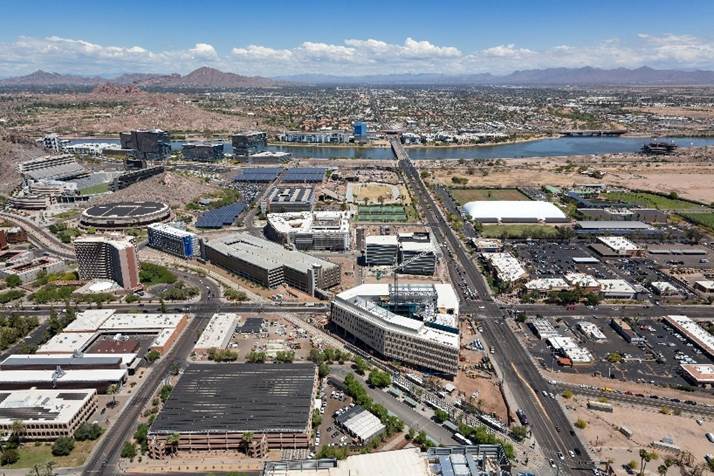The Novus Innovation Corridor (Novus), a 355-acre, multi-phased urban mixed-use development on the Tempe campus of Arizona State University (ASU) will have significant economic impact on the greater Phoenix area as projected by ASU’s Seidman Research Institute (Seidman).
Construction of completed and currently active projects in Novus will generate an economic impact of $1.86 billion*. Seidman also projects 33,734 jobs will be created by 2035 through office, hotel, multifamily and retail operations in Novus. Additionally, more than 20,000 temporary construction jobs related to development will also be generated.
These projections are part of a report recently completed by Seidman using the REMI economic forecast model, which estimates multiplier effects over time.
READ ALSO: Here’s why Scottsdale and Tempe are experiencing a development boom
Novus is a partnership between master developer Catellus Development Corporation and ASU’s University Real Estate Development Team, who is responsible for delivering both an exceptional physical environment to all customers of the university as well as enrich ASU’s real estate portfolio. Located adjacent to Tempe Town Lake, Novus is one of the most progressive, urban, mixed-use developments in the United States. At completion, Novus will encompass over 10 million square feet of retail, restaurants, residential urban living, hotels and office space, and will be the premier destination for live, work, play.
Novus will span four distinctive neighborhoods within an integrated framework that includes pedestrian thoroughfares and numerous outdoor public spaces, all served by an extensive, multi-modal transportation system. Novus integrates world-class facilities and innovative technologies, reflecting ASU’s vision of the New American University and its role as the focal point of the region’s progress toward international leadership in innovation.
The $1.86 billion construction impact includes the 2.1 million-square-foot Marina Heights office complex (Phase I) along Tempe Town Lake, the renovation of Sun Devil Stadium (Phase II), completed and current construction activity in Phase III, as well as ASU’s newest research and athletics facilities within Novus. Phase III is comprised of 19 gross acres at the prime northwest corner of University Drive and Rural Road. New development in Novus includes:
• Hyatt House/Hyatt Place hotel (open)
• 777 Tower at Novus office building with street-level retail (open)
• The Piedmont multi-family residences with street-level retail (under construction)
• 1,800-space Novus Place Garage (open)
• ISTB 7, a 281,000-square-foot ASU research building (under construction)
• State-of-the-art Sun Devil Athletics and intramural fields in the expanding Athletics Village located east of Rural Road.
Additional office, residential and retail development activity is already in the pipeline for Phase III and future phases of the Athletics Village will include new venues for ASU’s track and field, tennis and beach volleyball programs.
“Our economic impact projections are based on the current slate of projects either completed, under construction or in the development pipeline. As more projects are approved and ultimately constructed, the impact of Novus will grow even larger,” said Dennis Hoffman, director of the Seidman Research Institute at ASU.
“Development within the Novus Innovation Corridor aligns with our vision of being the leading American center for innovation and entrepreneurship at all levels,” said Dr. Michael Crow, president of ASU. “The benefits to our students, faculty, the university, the City of Tempe and the business community are already being felt – and they will only increase as other visionaries construct new buildings and facilities to provide opportunities within Novus’ framework,” he added.
Novus is one of seven ASU Innovation Zones, including the Arizona Health Solutions Corridor, ASU Polytechnic campus, ASU Research Park, ASU West Campus and SkySong – the ASU Scottsdale Innovation Center.
“Ultimately, the growth, jobs and commerce associated with Novus will enable the university to operate from a stronger and more economically enviable position,” said Morgan Olsen, Ph.D., executive vice president, treasurer and CFO of ASU. “Everything we are doing within Novus and our other innovation zones is focused on creating a sustainable financial model for the immediate future and the rest of this century.”
Although the global COVID-19 pandemic curtailed work in many locations over the past year, construction activity within Novus proceeded on schedule as crews wore masks, practiced social distancing and incorporated strict sanitation standards.
“We’re proud of our development and construction partners for taking all necessary and appropriate precautions to remain on schedule,” said Charley Freericks, senior vice president at Catellus Development Corporation, the master developer of Novus. “The opportunities for business, research, retail and residential within Novus continue to gain momentum. We’re seeing interest from organizations representing each of these sectors that want to be part of the growth here,” he added.
As new projects and businesses populate the Novus landscape in the coming years, the economic impact will only increase. “While the pandemic may provide short term headwinds, the fundamentals for commercial development in Greater Phoenix and Tempe remain strong, suggesting that our estimates for the impact of the Novus Innovation Corridor will continue to increase over time,” Hoffman said.
“The Novus Innovation Corridor, and its enormous economic impact, is one of many reasons U.S. News and World Report has ranked ASU as America’s Most Innovative University each of the past six years,” Dr. Crow added.
*This economic impact is measured by gross domestic product (GDP), or the dollar value of all goods and services purchased in the state of Arizona.




